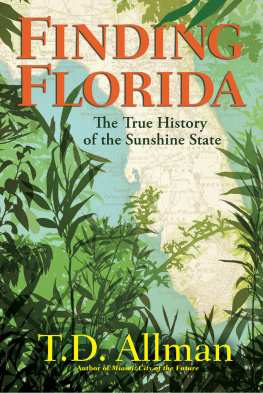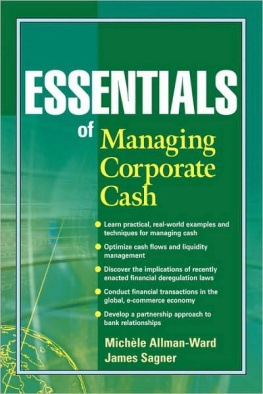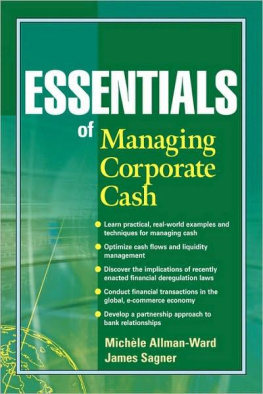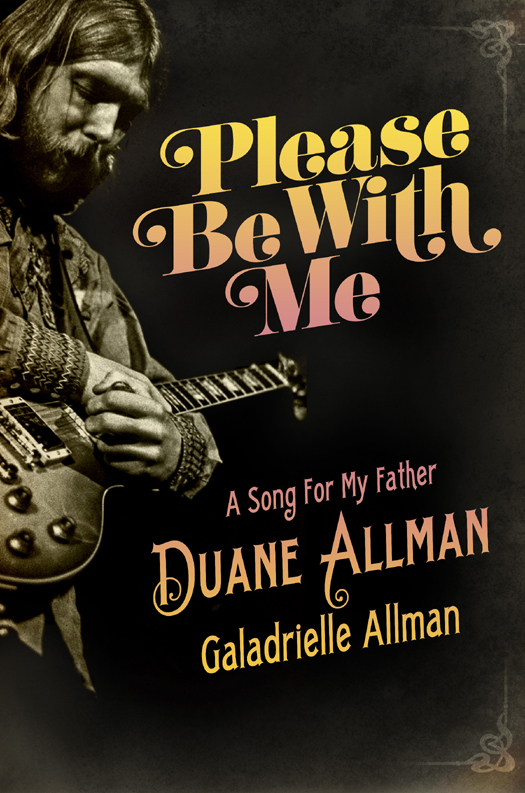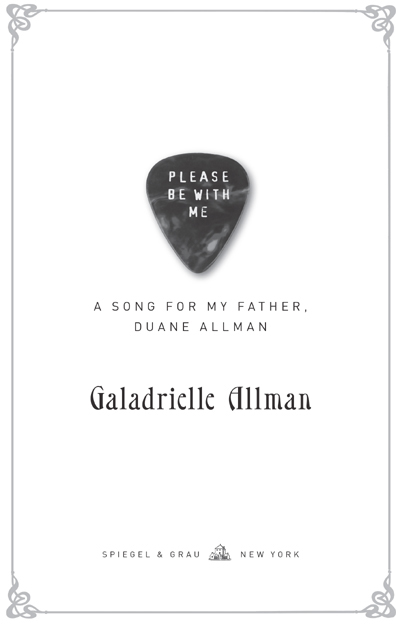Please Be with Me is a work of nonfiction.
Some names and identifying details have been changed.
Copyright 2014 by Galadrielle Allman
All rights reserved.
Published in the United States by Spiegel & Grau, an imprint of Random House, a division of Random House LLC, a Penguin Random House Company, New York.
S PIEGEL & G RAU and the H OUSE colophon are registered trademarks of Random House LLC.
Grateful acknowledgment is made to the following for permission to reprint previously published material:
Tim Buckley Music: Excerpt from Once I Was by Tim Buckley and Larry Beckett, copyright 1968 and copyright renewed 1996 by Tim Buckley Music (ASCAP) & BMG Platinum Songs o/b/o Third Story Music (BMI). All rights reserved. Used by permission.
Elijah Blue Music, Alfred Music Publishing Co., Inc.: Excerpt from Melissa written by Gregg Allman and Steve Alaimo, copyright 1972 by Elijah Blue Music/Unichappell Music Inc./EMI Longitude Music. All rights reserved. Used by permission.
Linda Miller: Three letters written by Berry Oakley. Used by permission.
All credits for reproduction of photographs can be found on .
Library of Congress Cataloging-in-Publication Data
Allman, Galadrielle, author.
Please be with me: a song for my father, Duane Allman / Galadrielle Allman.
pages cm
ISBN 978-1-4000-6894-4
eBook ISBN 978-1-58836-960-4
1. Allman, Duane, 19461971. 2. Allman, Galadrielle. 3. Rock musiciansUnited StatesBiography. 4. Allman Brothers Band. I. Title.
ML419.A565A45 2014
787.87166092dc23
[B] 2013046247
www.spiegelandgrau.com
Jacket design: Greg Mollica and Justin Thomas Kay
Jacket photograph: John Gellman
v3.1
Where the myth fails, human love begins. Then we love a human being, not our dream, but a human being with flaws.
Anas Nin
Contents
Introduction
CHICAGO AUDITORIUM THEATRE, 1974
Beyond the circles of light cast over the bands waiting instruments, I felt the vast, moving crowd in the darkness. My mother stood at the edge of the stage, holding me on her hip, my head resting on her shoulder. I was four years old. My uncle Gregg walked up to us, his long blond hair tucked behind one ear, smiling at me with heavy-lidded eyes. He wore a white suit, rings on his fingers, and a silver ankh around his neck. He smelled of warm cologne and cigarettes, and looked as clean and pretty as a doll. He lifted me out of my mothers arms and walked a few steps into the white light. I remember the whistling cheer that washed over the stage like a wave when the audience saw him. Little flames from lighters, raised in outstretched hands, shone like distant boats on a night sea. Gregg spoke into a microphone at center stage, holding me curled against him, my face hidden in his neck. His low whisky voice called out, This is my brothers little girl, and he lives on through her.
He lifted me out into the darkness and the whistles turned into a roar.
My father is killed in the first paragraph of every article ever written about him. His life story is told backward, always beginning at the end: in the road, his motorcycle down, his body broken. People linger over the wreckage as if it says something meaningful about his life. Duane is most often described as a rock star, although he did not live long enough to know how famous he would become. His brief, brilliant life has become mythic, a cautionary tale and a clich: Live fast, die young.
Duane Allmans story is more than a tragedy; it is a true romance. He fell in love with his guitar and gave his heart away. At fifteen years old, he often stayed up all night, bent over on the couch, his fingers wandering the frets of his guitar in the dark. His mother would come home late from the restaurant where she worked and find him playing with reddened fingertips and a crick in his neck, deaf to the sound of the front door. Shed go to sleep and wake in the morning to find him in the exact posture he had been in the night before, still playing. When she asked him what he was doing, pushing himself so hard, he said, Mama, Im searching for my sound. Id go hungry to play this guitar.
The sound he found helped change the way the world perceived the South. White southern boys were most known for backward thinking and racist cruelty. My fathers guitar sang out idealistic, astounding music that tipped that notion over. The Allman Brothers Band made every southerner with a radio proud of himself. Their music described a world of tough towns and darkened woods, men laughing down the length of beer-soaked bars or sitting alone in their rooms, waiting by their telephones. You can hear them yearning in their songs, and growling out their defiance, refusing to be chained. The Allman Brothers took the blues, the root of all American music, and electrified it in a way no American band ever had with an integrated band in the segregated South. It was revolutionary.
Duane played guitar so beautifully the world came to him. Eric Clapton, Aretha Franklin, Wilson Pickett, King Curtis, Boz Scaggs. Famous recording artists sought out this young man to record at FAME Studios and Muscle Shoals Sound in Muscle Shoals, Alabama; Atlantic Records in New York; and Criteria Studios in Miami. His remarkable talent brought him the opportunity to build a band of his own, and he formed a group of players that matched his skill and his commitment to playing, note for note. They raised the bar for one another, each honing his skill against the other, blade against stone. The powerful chemistry between the Brothers came together so fast it seemed magical and destined.
The Allman Brothers Band became known for their epic live performances, six men synched up and improvising in the jazz style. No two shows were the same. Success came to them very quickly. Inside of three years, a private jet replaced their tour bus, which had replaced the Winnebago and their first Econoline van. Dive bars and public parks where they played for free overflowed into beautiful old theaters, until stadiums were packed with thousands of fans. They built their following, playing hundreds of shows from the Fillmore in San Francisco to the Fillmore East in New York City. They called traveling from one coast to the other their commute, no joke. Drugs, decadence, and a growing darkness came along, tucked into their pockets. The Allman Brothers Band was the number-one band in America in 1972, and by then my father was already gone.
According to Rolling Stone magazine, Duane Allman is remembered as one of the greatest rock guitarists of all time, second only to Jimi Hendrix. Just a few short years into his remarkable career, after creating several of the best-loved rock-and-roll albums ever recorded, he was killed in a motorcycle accident at the intersection of Hillcrest Avenue and Bartlett Street in Macon, Georgia, on October 29, 1971. He was twenty-four years old and I was two. We never had the chance to know each other.
The band continued on without my father, and my mom took me to Allman Brothers concerts every year when I was a kid. We went with groups of women and children, all related in some way to the band. Our mothers made the annual pilgrimage to return us to our nomadic tribe, the band of men we had long since parted from, through death, divorce, or distance.
The Brothers played stadiums in the seventies, massive domes of concrete rising like dark castles on the outskirts of town. My mother carried me through the back doors, which were guarded like a fortress by burly guards in satin tour jackets, their arms crossed in front of their chests. She would stick her backstage pass to her blue-jeaned thigh and sail through the gauntlet with a mention of our names. In every city, backstage was the samea rabbit warren of hallways leading to small gray rooms glowing with fluorescent light. Mom switched me from one hip to the other, then sat my squirming self on a metal folding chair. We waited for what seemed like hours for the band to arrive, picking at trays of cold cuts and digging our hands into iced buckets full of drinks. We kids gobbled handfuls of M&Ms and chased each other around the tight passageways until someone settled us down. Clusters of people dressed in wild finery waited in the hallways: young blondes in hot pants, grizzled guys in leather vests, and moguls in three-piece suits. You could feel how much everyone wanted into the rooms where we waited alone.


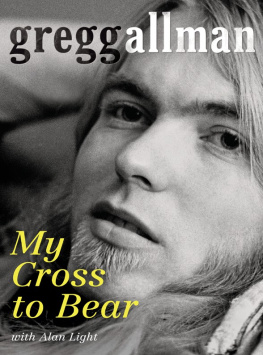
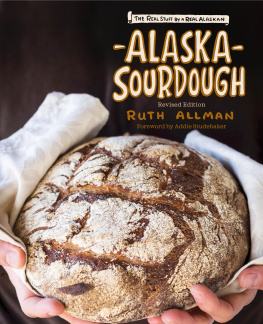
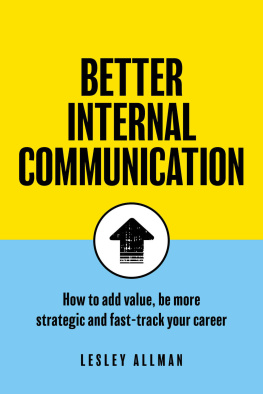
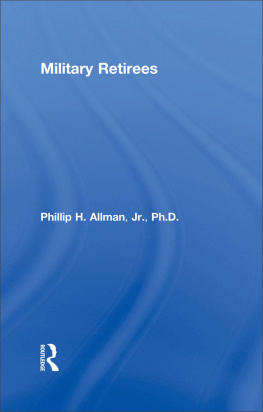
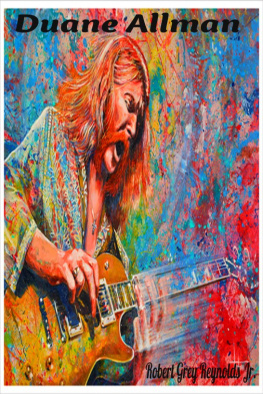
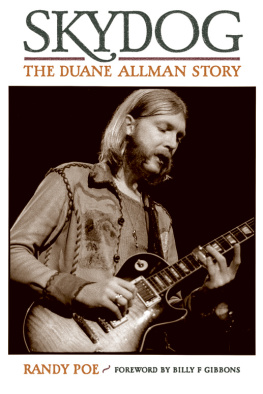
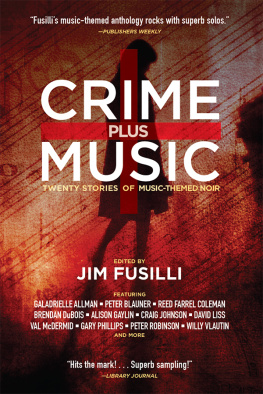
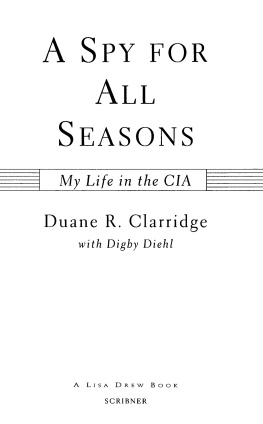
![Keith A. Allman [Keith A. Allman] - Impact Investment: A Practical Guide to Investment Process and Social Impact Analysis](/uploads/posts/book/124124/thumbs/keith-a-allman-keith-a-allman-impact.jpg)
